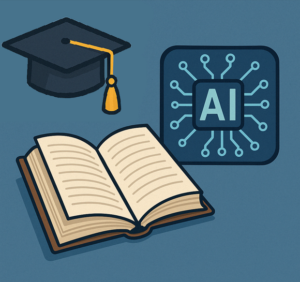2. Βιβλιογραφικές Αναφορές
 Al Ka’bi, A. (2023). Proposed artificial intelligence algorithm and deep learning techniques for development of higher education. International Journal of Intelligent Networks, 4, 68–73. https://doi.org/10.1016/j.ijin.2023.03.002
Al Ka’bi, A. (2023). Proposed artificial intelligence algorithm and deep learning techniques for development of higher education. International Journal of Intelligent Networks, 4, 68–73. https://doi.org/10.1016/j.ijin.2023.03.002
Annamalai, N., Bervell, B., Mireku, D. O., & Andoh, R. P. K. (2025). Artificial intelligence in higher education: Modelling students’ motivation for continuous use of ChatGPT. Computers and Education: Artificial Intelligence, 8, 100346. https://doi.org/10.1016/j.caeai.2025.100346
Lünich, M., Keller, B., & Marcinkowski, F. (2024). Diverging perceptions of artificial intelligence in higher education: A comparison of student and public assessments on risks and damages of academic performance prediction in Germany. Computers and Education: Artificial Intelligence, 7, 100305. https://doi.org/10.1016/j.caeai.2024.100305
Malik, A. R., Pratiwi, Y., Andajani, K., Numertayasa, I. W., Suharti, S., Darwis, A., & Marzuki. (2023). Exploring artificial intelligence in academic essay: Higher education student’s perspective. International Journal of Educational Research Open, 5, 100296. https://doi.org/10.1016/j.ijedro.2023.100296
McDonald, N., Johri, A., Ali, A., & Collier, A. H. (2025). Generative artificial intelligence in higher education: Evidence from an analysis of institutional policies and guidelines. Computers in Human Behavior: Artificial Humans, 3, 100121. https://doi.org/10.1016/j.chbah.2025.100121
McGrath, C., Pargman, T. C., Juth, N., & Palmgren, P. J. (2023). University teachers’ perceptions of responsibility and artificial intelligence in higher education: An experimental philosophical study. Computers and Education: Artificial Intelligence, 4, 100139. https://doi.org/10.1016/j.caeai.2023.100139
Tzirides, A. O., Zapata, G., Kastania, N. P., Saini, A. K., Castro, V., Ismael, S. A., You, Y., dos Santos, T. A., Searsmith, D., O’Brien, C., Cope, B., & Kalantzis, M. (2024). Combining human and artificial intelligence for enhanced AI literacy in higher education. Computers and Education Open, 6, 100184. https://doi.org/10.1016/j.caeo.2024.100184
Zhang, J., Goyal, S. B., & Rajawat, A. S. (2024). The informational role of artificial intelligence in higher education in the new era. Procedia Computer Science, 235, 1008–1023. https://doi.org/10.1016/j.procs.2024.04.096
Alqahtani, T., Badreldin, H. A., Alrashed, M., Alshaya, A. I., Alghamdi, S. S., bin Saleh, K., Alowais, S. A., Alshaya, O. A., Rahman, I., Al Yami, M. S., & Albekairy, A. M. (2023). The emergent role of artificial intelligence, natural learning processing, and large language models in higher education and research. Research in Social and Administrative Pharmacy, 19, 1236–1242. https://doi.org/10.1016/j.sapharm.2023.05.016
Zawacki-Richter, O., Marín, V. I., Bond, M., & Gouverneur, F. (2023). Artificial intelligence trends in education: A narrative overview. Educational Research Review, 40, 100526. https://doi.org/10.1016/j.edurev.2023.100526
von Garrel, J., & Mayer, J. (2024). Which features of AI-based tools are important for students? A choice-based conjoint analysis. Computers and Education: Artificial Intelligence, 7, 100311. https://doi.org/10.1016/j.caeai.2024.100311
